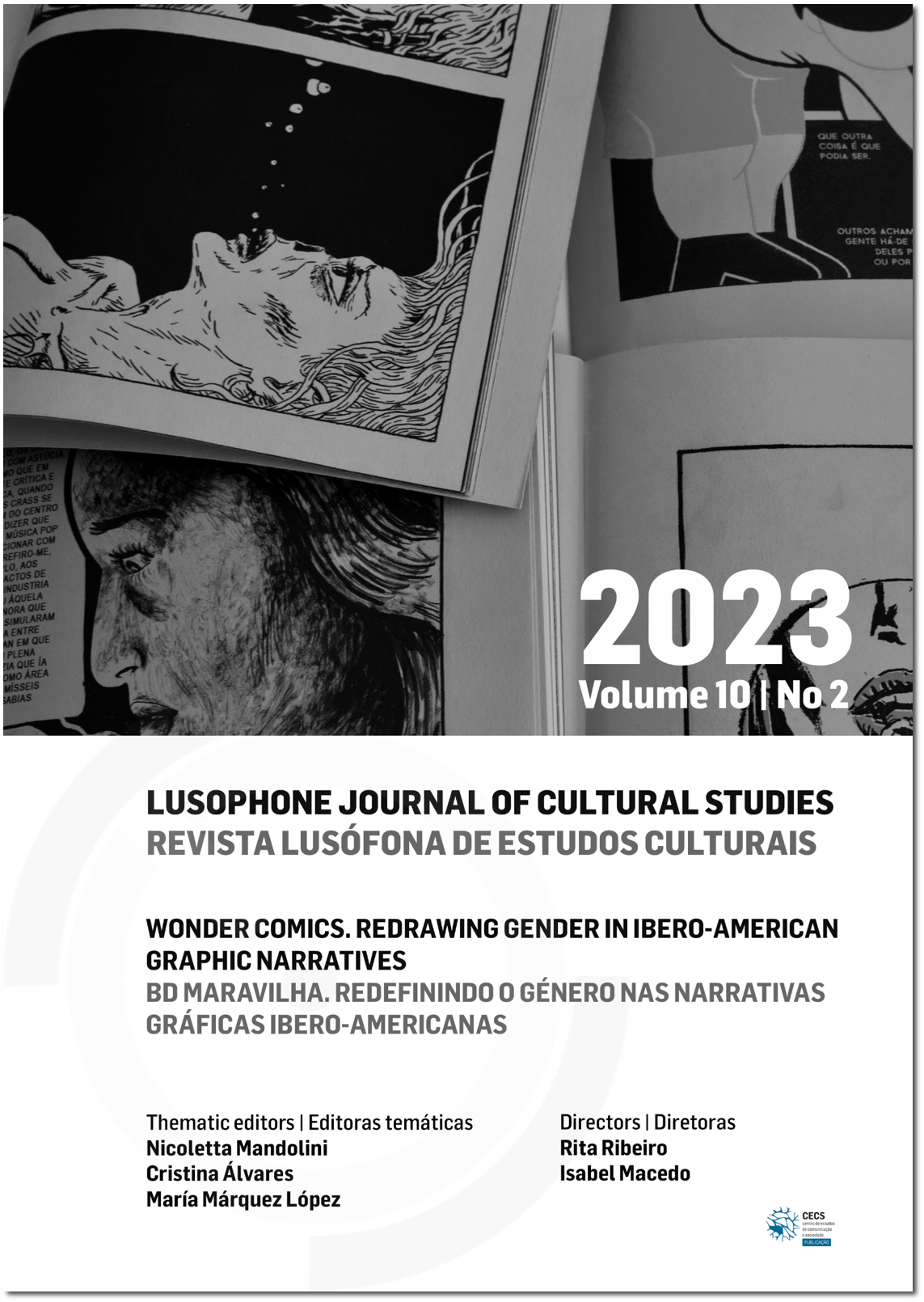Shared Coordinates: Writing Herstory in Ibero American Comics
DOI:
https://doi.org/10.21814/rlec.4681Keywords:
feminist collective, exhibition, herstory, genealogy, history of comicsAbstract
This study focuses on the emergence of a transnational sisterhood under three projects originating from the cooperation between groups of female comic book writers in Spain and Latin America. After the 2016 exhibition “Presentes: Autoras de Tebeo de Ayer y de Hoy” and the publication of its catalogue by Autoras de Cómic, there was a shared need to claim back the role of female or non-male authorship, and its involvement in comic book production and business. The Argentinian group Feminismo Gráfico tapped into such endeavors, and in 2019 produced “Nosotras Contamos”, a travelling exhibition and a catalogue, with a thematic and a diachronic approach. When COVID-19 broke out, Spanish and Argentinian cooperation and development institutions (Agencia Española de Cooperación Internacional y Desarrollo and Centro Cultural España Córdoba) engaged in a discussion on the previous experiences. The project resulted in a publication and an online exhibition Coordenadas Gráficas (Graphic Coordinates), highlighting the work of non-male authors from Spain, Argentina, Chile, and Costa Rica. The transnational perspective of this last project extends beyond the previous national experiences and includes a meaningful selection of comic stories that, regardless of the nationality of the author, can be defined as feminist. Sexism, gender discrimination, gender violence, and sexual and reproductive rights are the shared coordinates discussed by this long list of authors, who question gender normativity from its very composition. By introducing the associative experiences that gave life to the projects and analyzing them in the international context, the study will focus on the appropriate practice of sharing knowledge to pursue a similar recognition. Moreover, based on the words of the curators and the creators, the study ultimately seeks to shed light on the production and circulation of works of collective interest, meant to recover the role of women in the history of comics.
Downloads
References
Acevedo, M. (2019, November 7). Entrevista. Radio Monte Castro. https://ar.radiocut.fm/radiostation/
monte-castro/listen/2019/10/25/10/58/35
Acevedo, M. A. (2020). Nosotras contamos. Notas en torno a construir genealogía feminista en el campo de la historieta y el humor gráfico (Argentina, 1933-2019). Tempo e Argumento, 12(31), 1–28.
Acevedo, M. A., Mamone, J. I., Ruggeri, D., & Oliva H. (2019). Nosotras contamos. Un recorrido por la obra de autoras de historieta y humor gráfico de ayer y de hoy. Feminismo Gráfico; Fondo Metropolitano Ciudad de Cultura, Artes y Ciencias.
Argudo Martínez, A. (2020). Las mujeres dibujantes durante el boom del cómic adulto en España: Trayectoria y producción (1975-1992) [Doctoral dissertation, Universidad Complutense de Madrid]. Docta. https://hdl.handle.net/20.500.14352/11001
Autoras de Cómic. (2017, March 3). Presentes: Autoras de tebeo de ayer y hoy [Video]. Vimeo. https://vimeo.com/206609128
Chute, H. L. (2015). The space of graphic narrative. Mapping bodies, feminism and form. In R. Wahrol & S. Lanser (Eds.), Narrative theory unbound: Queer and feminist interventions (pp. 194–209). The Ohio State University Press.
Colectivos Autoras de Cómic, Berrocal, C., & McCausland E.(2016). Presentes. Autoras de tebeo de ayer y de hoy. AECID; Colectivos Autoras de Cómic.
Lonzi, C. (1970). Manifesto di rivolta femminile. In C. Lonzi (Ed.), Sputiamo su Hegel. La donna clitoridea e la donna vaginale e altri scritti. Rivolta femminile.
Mayayo, P. (2013). Imaginando nuevas genealogías. Una mirada feminista a la historiografía del arte español contemporáneo. In J. V. Aliaga & P. Mayayo (Eds.), Genealogías feministas en el arte español contemporáneo 1960-2010 (pp. 19–39). MUSAC.
McCausland, E. (2016). Por una hermandad de autoras de cómic. In Colectivos Autoras de Cómic, C. Berrocal, & E. McCausland (Eds.), Presentes. Autoras de tebeo de ayer y de hoy (pp. 39–46). AECID; Colectivos Autoras de Cómic.
McCausland E., Acevedo M., Domínguez Jería P., Molina I., & Lam I., (2020). Coordenadas gráficas. Cuarenta historietas de autoras de España, Argentina, Chile y Costa Rica. AECID; Cooperación Española.
Meriles, A. (2019a). El rescate de una comunidad a través del montaje en la muestra Presentes. Autoras de tebeo de ayer y de hoy. In C. Ortiz, C. R. Zuccarino, & M. E. Ferreyra (Eds.), Encuentro Nacional de
Carreras de Comunicación-ENACOM: Proceedings book (pp. 134–136). César Rogelio Zuccarino.
Meriles, A. (2019b). El rescate de una comunidad a través del montaje en la muestra Presentes. Autoras de tebeo de ayer y de hoy [Abstract].
Miralles, A. (2014). Zumbido. In S. Martín (Ed.), Enjambre, (pp.6–8). Norma Editorial.
Restrepo, A. (2016). La genealogía como método de investigación feminista. In N. Blazquez Graf & M. P. Castañeda Salgado (Eds.), Lecturas críticas en investigación feminista (pp. 23–41). Universidad Nacional Autónoma de México.
Sánchez, J. (2023). Approaches to remember the bodies in two Latin American comics: Notas al Pie by Nacha Vollenweider and Las Sinaventuras de Jaime Pardo by Vicho Plaza. In L. C. Fernández, A. Gandolfo, & P. Turnes (Eds.), Burning down the house. Latin American comics in the 21st century (pp. 149–165). Routledge.
Sobre el Colectivo Autoras de Cómic. (n.d.). Autoras de Cómic. Retrieved June 2, 2023, from http://asociacionautoras.blogspot.com/p/sobre-la-asociacion.html
White, H. (1978). Tropics of discourse. Essays in cultural criticism. The Johns Hopkins University Press.
Wrobel, J. (2023). Resisting imposed lines. (Feminine) territoriality in the work of Chilean comic artist Panchulei. In L. C. Fernández, A. Gandolfo, & P. Turnes (Eds.), Burning down the house. Latin American comics in the 21st century (pp. 166–182). Routledge.
Downloads
Published
How to Cite
Issue
Section
License
Copyright (c) 2023 Virginia Tonfoni

This work is licensed under a Creative Commons Attribution 4.0 International License.
Authors own the copyright, providing the journal with the right of first publication. The work is licensed under a Creative Commons - Atribuição 4.0 Internacional License.








